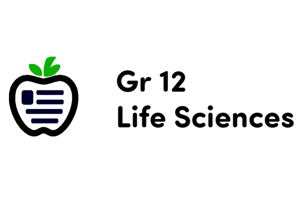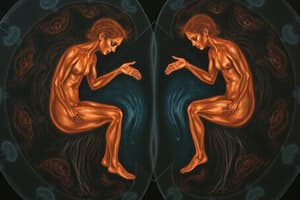Podcast
Questions and Answers
Which phase of meiosis is primarily responsible for recombination?
Which phase of meiosis is primarily responsible for recombination?
- Anaphase II
- Prophase I (correct)
- Telophase II
- Metaphase I
During meosis II, haploid cells remain haploid after division.
During meosis II, haploid cells remain haploid after division.
True (A)
What does recombination create during meiosis?
What does recombination create during meiosis?
New combinations of alleles
________ cells are produced after meiosis.
________ cells are produced after meiosis.
Match the following meiosis phases with their key events:
Match the following meiosis phases with their key events:
What is the likelihood of gene A and B being inherited together?
What is the likelihood of gene A and B being inherited together?
Chiasma refers to the point where crossover events occur between non-homologous chromosomes.
Chiasma refers to the point where crossover events occur between non-homologous chromosomes.
What is the term used when there is an abnormal number of chromosomes in gametes?
What is the term used when there is an abnormal number of chromosomes in gametes?
The chance that gene A and C alleles are inherited together is _____%.
The chance that gene A and C alleles are inherited together is _____%.
Match the following terms with their definitions:
Match the following terms with their definitions:
Which meiotic division is least likely to result in aneuploidy?
Which meiotic division is least likely to result in aneuploidy?
If genes are located on different chromosomes, they will always be inherited together.
If genes are located on different chromosomes, they will always be inherited together.
What does the term 'haploid' refer to?
What does the term 'haploid' refer to?
What is the primary outcome of meiosis compared to mitosis?
What is the primary outcome of meiosis compared to mitosis?
Independent assortment ensures that alleles segregate randomly during the formation of gametes.
Independent assortment ensures that alleles segregate randomly during the formation of gametes.
What is aneuploidy?
What is aneuploidy?
In meiosis, a reduction in the chromosome number occurs during ________.
In meiosis, a reduction in the chromosome number occurs during ________.
Match each condition with its description:
Match each condition with its description:
Which of the following occurs during homologous recombination?
Which of the following occurs during homologous recombination?
All genetic mutations affect reproductive organs.
All genetic mutations affect reproductive organs.
What is the outcome of random fertilization?
What is the outcome of random fertilization?
After meiosis, the resulting gametes have a __________ set of chromosomes.
After meiosis, the resulting gametes have a __________ set of chromosomes.
What is the total number of chromosomes in a diploid cell denoted as?
What is the total number of chromosomes in a diploid cell denoted as?
What is the result of non-disjunction during meiosis 2?
What is the result of non-disjunction during meiosis 2?
The likelihood of having a child with Down Syndrome decreases as a mother ages.
The likelihood of having a child with Down Syndrome decreases as a mother ages.
What chromosomal disorder is associated with extra digits and serious brain problems?
What chromosomal disorder is associated with extra digits and serious brain problems?
During metaphase, chromosomes line up and a __________ is taken.
During metaphase, chromosomes line up and a __________ is taken.
What is the fate of most infants with trisomy 18?
What is the fate of most infants with trisomy 18?
Match the chromosomal disorders with their main characteristics:
Match the chromosomal disorders with their main characteristics:
Mitosis is responsible for the production of gametes in all organisms.
Mitosis is responsible for the production of gametes in all organisms.
What is the chromosome configuration of a 'Super Male'?
What is the chromosome configuration of a 'Super Male'?
Flashcards
Haploid (n)
Haploid (n)
A cell containing one set of chromosomes.
Diploid (2n)
Diploid (2n)
A cell containing two sets of chromosomes.
Meiosis
Meiosis
Cell division that results in four haploid daughter cells.
Recombination
Recombination
Signup and view all the flashcards
Linked Genes
Linked Genes
Signup and view all the flashcards
Crossing Over
Crossing Over
Signup and view all the flashcards
Chiasma
Chiasma
Signup and view all the flashcards
Independent Assortment
Independent Assortment
Signup and view all the flashcards
Aneuploidy
Aneuploidy
Signup and view all the flashcards
Non-disjunction
Non-disjunction
Signup and view all the flashcards
Gamete
Gamete
Signup and view all the flashcards
Homologous recombination
Homologous recombination
Signup and view all the flashcards
Random fertilization
Random fertilization
Signup and view all the flashcards
Non-disjunction in Meiosis II
Non-disjunction in Meiosis II
Signup and view all the flashcards
Down Syndrome
Down Syndrome
Signup and view all the flashcards
Trisomy 13 (Patau Syndrome)
Trisomy 13 (Patau Syndrome)
Signup and view all the flashcards
Trisomy 18 (Edwards Syndrome)
Trisomy 18 (Edwards Syndrome)
Signup and view all the flashcards
Supermale
Supermale
Signup and view all the flashcards
Study Notes
Genetic Variety and Diversity
- Homologous recombination shuffles alleles along chromosome pairs
- Independent assortment: alleles align randomly during meiosis
- Random fertilization: specific sperm fertilizes egg randomly producing unique zygotes
Mitosis
- Single cell division creating two identical daughter cells
- Two identical sets of chromosomes
- Occurs in somatic (body) cells
Meiosis
- Two-part cell division producing four non-identical daughter cells
- Each cell contains half the original chromosomes
- Occurs in sex organs (ovaries and testes), creating gametes (sperm and egg cells)
Meiosis I (Reductional)
- Homologous chromosomes separate
- Recombination occurs, creating new gene combinations
Meiosis II (Equational)
- Sister chromatids separate similarly to mitosis
- Creates four genetically unique haploid gametes
Recombination
- Reshuffling of alleles from homologous chromosomes
- Creates new allele combinations within gametes
Linked Genes
- Genes located near each other on a chromosome
- More likely to be inherited together due to low chance of crossing-over
Aneuploidy
- Abnormal number of chromosomes due to errors in meiosis
- Causes different chromosome copies during gamete creation
- Nondisjunction: Chromosomes fail to separate during meiosis, resulting in gametes with extra or missing chromosomes
Sex Chromosome Combinations in Zygotes
- Errors in meiosis can lead to abnormal sex chromosome combinations
- Examples: Turner syndrome (XO), Klinefelter syndrome (XXY), Triple X syndrome (XXX)
Super Male
- 47, XYY karyotype (one extra Y chromosome)
Animal Life Cycle
- Zygote (2n) undergoes mitosis to develop into an organism
- Organisms produce haploid gametes through meiosis
- Fertilization produces a zygote, completing the cycle
Plant and Fungi Life Cycle
- Sporophyte (2n) undergoes meiosis to produce spores (n)
- Spores germinate into gametophytes
- Gametophytes produce gametes (n) through mitosis
- Fertilization produces a zygote (2n), the starting point
Studying That Suits You
Use AI to generate personalized quizzes and flashcards to suit your learning preferences.




